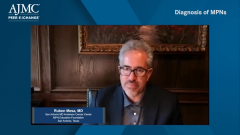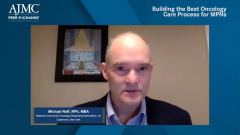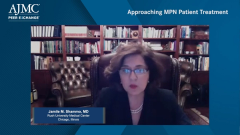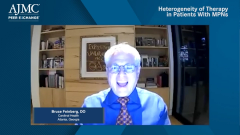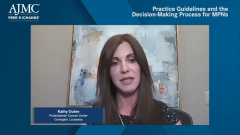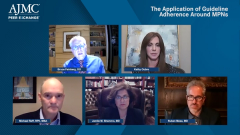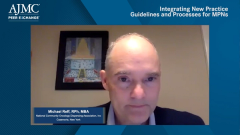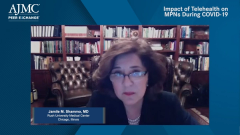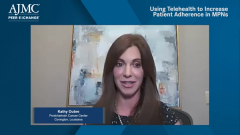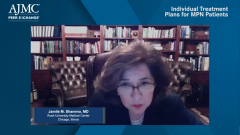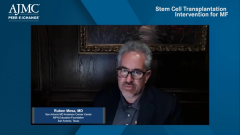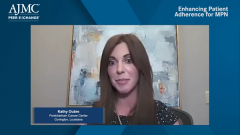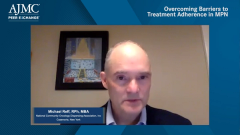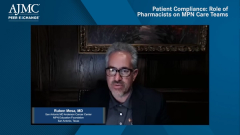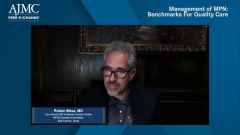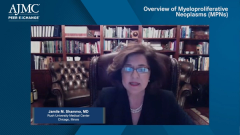
Stem Cell Transplantation Intervention for MF
Ruben Mesa, MD, shares his thoughts on stem cell transplantation related to progression-free survival in MPNs, and Kathy Oubre highlights the importance of good working relationships.
Episodes in this series

Bruce Feinberg, DO: Any time we use the risk stratification and separate our ET [essential thrombocythemia] and PV [polycythemia vera] from MPNs [myeloproliferative neoplasms], is there any sense of that predictability in course and expectation around how long they will go with conservative management before you will need to be more aggressive?
Ruben Mesa, MD: I find that the prognostic scores—and there have been many; there has been much work done in this regard—are helpful for populations, but they are less helpful for individuals. I agree with Jamile, but in ET and PV, probably less so. I do not think the issue of prognosis and survival is particularly helpful because they have pretty long survivals overall. Their value is greatest in myelofibrosis regarding the decision-making with stem cell transplantation.
In terms of medical therapies, because most of them require therapy, you are judging this based on the surrogate end points in terms of clinical benefit and progression-free survival, so the prognostic scores are less beneficial. They definitely inform the difficult decision-making regarding stem cell transplantation. That is what makes it quite distinct from most solid tumors but perhaps closer to some other hematologic malignancies. Because stem cell transplant is so dramatically different in prevention in terms of its intensity, in terms of its expanse, and in terms of its treatment-related mortality, that is very informative.
Bruce Feinberg, DO: Kathy, in a community practice like yours [Pontchartrain Cancer Center], do you have a specific transplant center that is the practice’s center of choice?
Kathy Oubre: Yes, we do.
Bruce Feinberg, DO: Is there a transplant doctor at that center that has a relationship with the practice, so it becomes a doctor-to-doctor call as opposed to a blind referral in?
Kathy Oubre: Yes, there are 2 of them, quite frankly, we go to dinner with them periodically.
Bruce Feinberg, DO: That is fabulous, because 1 of the problems is that, in order to improve that quality of care, to have the level of expertise available, and to become almost an extension of the practice, it is important to have that kind of relationship. It is not a blind call to a center and a referral; rather, it is a phone call between 2 people who know each other and understand a bit about the way they think and the way they work.
Kathy Oubre: That is exactly right. I think we would all agree, but that is ultimately what provides a better level of care for a patient: to have a colleague who thinks like you do, and you get along and share those same common goal. Yes, they answer each other’s phone calls, and they answer each other’s texts. That kind of access to each other has value.
Transcript edited for clarity.
Newsletter
Stay ahead of policy, cost, and value—subscribe to AJMC for expert insights at the intersection of clinical care and health economics.
